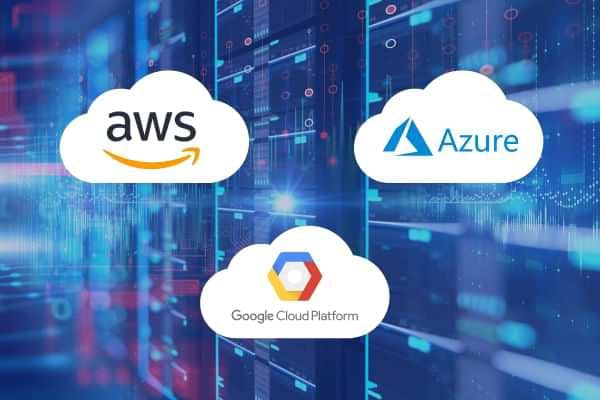By 2022, the cloud will be capable of meeting all a company's IT needs: applications, storage, calculations, massive data analysis and networking, cyber security... Amazon, Microsoft and Google are all jockeying to offer their services. Which offer should you choose? Loïc Thobois, an expert in the field, helps us to see things more clearly.

In the almost 20 years that the cloud has been around, the number of services coming onto the market has been countless. So many, in fact, that it's hard to make sense of them all, to understand them and compare them.
To make matters worse, different definitions of the cloud have come and gone. Today, the most popular is that of the NIST (National Institute of Standards and Technology), an agency of the US Department of Commerce.
It defines the cloud by five characteristics:
- On-demand services which require tools that enable customers to manage the lifecycle of their resources with complete autonomy, and an umbrella contract that covers the terms and conditions of both current and future platform services, avoiding the need for amendments whenever the architecture is modified.
- Dependence on the network the connection to services is via the network. The network must therefore be particularly closely monitored in terms of both availability and quality (bandwidth, latency, etc.).
- A grouping of resources by pool facilitates the implementation of multi-tenant architecture (each customer will have one or more tenants bringing together its resources). This enables the supplier to benefit from economies of scale when purchasing resources and to optimise their operation.
- Manual or automatic elasticity Scalability: scaling tools make it easier to adapt infrastructures to requirements. This can be done manually or by bias Indicators associated with trigger thresholds for certain resources (CPU, memory, request/s, etc.).
- Supervision of the services made available The supplier monitors and supervises resources in order to offer optimum quality of service and means of control, particularly with regard to customer billing.
What cloud services are available?
With a few rare exceptions, the various suppliers on the cloud computing market have positioned themselves on services that are often linked to their traditional area of activity.
For example, there are suppliers specialising in the following services
- IaaS (Infrastructure as a Service) providing virtual machine, network and storage infrastructures.
- PaaS (Platform as a Service) which will provide components to facilitate the deployment of application architecture via services ready to be integrated by application developers.
- SaaS (Software as a Service) which offer functionally operational turnkey software that can be marketed directly to end users.
So among the most popular services with the highest visibility are the big ones hyperscale platforms. These are the platforms of suppliers who have fully automated and optimised resource lifecycle management, including Microsoft Azure, Amazon AWS, Google Cloud Platform, IBM Cloud, Oracle Cloud, Alibaba Cloud and Huawei Cloud.
The market's cloud offering
Microsoft Azure
For the past fifteen years (2010 for Microsoft Azure), Microsoft has offered one of the broadest catalogues of services on the market, covering all service models. Its platform Microsoft Azure enables the deployment of IaaS virtual machines and PaaS platform components, and SaaS services will also be available via Microsoft 365, Microsoft Dynamics, Azure DevOps, Microsoft Intune, etc.
Far from Microsoft's proprietary origins, the platforms are very open to open source solutions (Linux, PHP, MariaDB, etc.) as well as services from first-tier partners (Citrix, RedHat, SAP, etc.) and second-tier partners (Oracle, F5, CheckPoint, etc.).
Amazon AWS
For almost 15 years (2006 for the first three services), Amazon AWS has been offering a range of services focused primarily on IaaS and PaaS. It is one of the oldest and most technically advanced platforms in the field.
Benefiting from its historic position, it offers a very wide choice of services in its catalogue. It is the most popular solution for companies that have historically chosen to host a large part of their infrastructure in the public cloud, known as the cloud native like Netflix, Airbnb, Uber...
Google Cloud Platform
Google Cloud Platform (GCP) began operations in 2008 with a few beta services, then officially opened in 2011 with a more comprehensive catalogue. While not lagging far behind its main competitors, a drop in investment over several years did the platform a disservice. Investment has picked up again in recent years, with a more targeted offering than its competitors. The IaaS offering is lagging behind technically, but the data platform is one of the most powerful.
The advantages and disadvantages of each platform
To assess the advantages and disadvantages of an IaaS/PaaS platform, a number of criteria need to be taken into account:
- Simplicity of administration making it easier for operations teams to get to grips with the system: Microsoft Azure dominates on this criterion, with web-based tools that provide an overview of the tenant's resources across all regions and are unrivalled by its competitors. GCP is fairly affordable, whereas Amazon AWS requires a much greater investment to master its tools and technical expertise.
- The richness of the service catalog : the offers of Microsoft Azure and Amazon AWS dominate on this criterion, even though GCP and IBM's offerings still provide the services needed by most businesses.
- The ability to set up a hybrid infrastructure : Microsoft has a strong presence in the IT systems of many companies. This position offers a major advantage over Google and Amazon solutions, for which you have to turn to partner solutions (VMware, specific private cloud integration, etc.). This means having to manage several suppliers in order to resolve any operational problems.
- Technical capabilities : Amazon AWS dominates the competition in terms of its ability to control and optimise the platform. This is also why large platforms prefer this provider. Other providers offer services that are a little more rigid, so the level of optimisation is less important or more complex.
- The costs The different providers are engaged in a fierce battle over the prices of their services. Prices vary regularly, but there is a certain homogeneity between Amazon AWS and Microsoft Azure where challengers such as GCP and Oracle Cloud are very aggressive.
As is often the case, each offer corresponds to specific needs. The relative importance of the above characteristics will guide your choice of supplier.
*Loïc Thobois
With over 10 years' experience in network and system administration and architecture, this Supinfo engineer is an expert in Docker and system supervision. Since 2001, he has also been a trainer on Microsoft and Cisco technologies.


